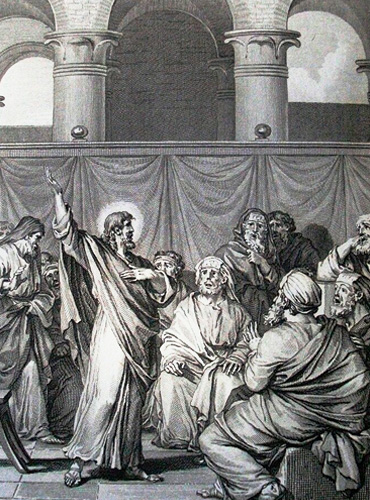Friday of the Ninth Week of Ordinary Time – Mk 12:35-37
Sometimes we come across Gospel passages that might make us scratch our heads and wonder, “What’s going on here?” Such might be the case of today’s Gospel. Although it is only three verses long, nonetheless, as one scholar puts it, “For us this is a difficult passage to understand, because it uses thoughts and methods of argument which are strange to us. But it would not be at all difficult for the crowd who heard it in the Temple precincts in Jerusalem, for they were well accustomed to just such ways of arguing and of using scripture.”[1]
In order to understand what is going on, let us consider, first, the two terms or titles that are being used, second, how they apply to Jesus, and what He is saying here, and, third, how this passage can apply to our lives.
The two titles that stand out in this passage are the Christ, and Son of David. The term Christ, which we use almost exclusively to mean Jesus, didn’t mean just Jesus for those of His time. Christ means anointed, referring to the kingly anointing,[2] and so, when Jesus speaks of the Christ, He’s referring to God’s anointed king, the savior who is to come to save and rule His people. It was thought that this Christ, this Messiah, would be the son of David, meaning, from David’s lineage. However, citing Psalm 110, Jesus points out that David himself calls this Christ “Lord,” meaning, that this Messiah is even greater than David himself.
So, how do these terms apply to Jesus? We know that Jesus is the Son of David, in the sense of being of David’s family line; the genealogies of both Matthew and Luke attest to this fact. Likewise, at this point, the crowds were already calling Jesus “Son of David” quite often; for instance, in Mark’s Gospel, two chapters earlier, the blind Bartimaeus twice calls out “Son of David” as Jesus passes by. Here, then, what Jesus is saying is, not only is He the Son of David, but also David’s Lord. He’s greater than David, because He has been anointed by the Holy Spirit to be the deliverer of God’s people, their Messiah and Savior in the greatest possible way: by saving His people from their sins and from eternal condemnation. Although His listeners probably assumed Jesus was confirming He was to be the great military savior who would restore the kingdom of Israel, nonetheless they were delighted with what they heard.
So, with this in mind: how do we apply this Gospel to ourselves? What is the lesson we can take away from it? On the one hand, Jesus’ words remind us that His Kingdom is “not of this world.” It’s true that we need to work against sin, injustice, and the like, but the Kingdom of God is not primarily of this world. As Saint Paul tells the Ephesians (6:1): “Our struggle is not with flesh and blood (meaning, against the people in this world) but with the principalities, with the powers, with the world rulers of this present darkness, with the evil spirits in the heavens.” The Kingdom of God cannot be reduced to material terms; while embracing God’s reign will bring with it social consequences, these are not the primary aim of it. The Kingdom of God is a kingdom of grace and salvation, not first and foremost of material prosperity. We can ask ourselves: what is the vision we have of Christ’s kingdom? Is it the right one, the one revealed in the Gospels, or a material one, or one focused on externals?
On the other hand, His listeners were overjoyed at hearing His declaration, even though they misunderstood it. How much more should we, who understand the greatness of the gifts we receive through Christ, rejoice when we think of Him and know that He has given us everything we need for eternal salvation?
Today, let us ask for the grace, through the intercession of Mary, the Queen of Heaven and Earth, for the grace to truly enter and form part of Christ’s kingdom and to always be joyful in the Lord.
[1] William Barclay’s commentary on this passage.
[2] Interestingly enough, even today the kings and queens of England are anointed when they are crowned.






